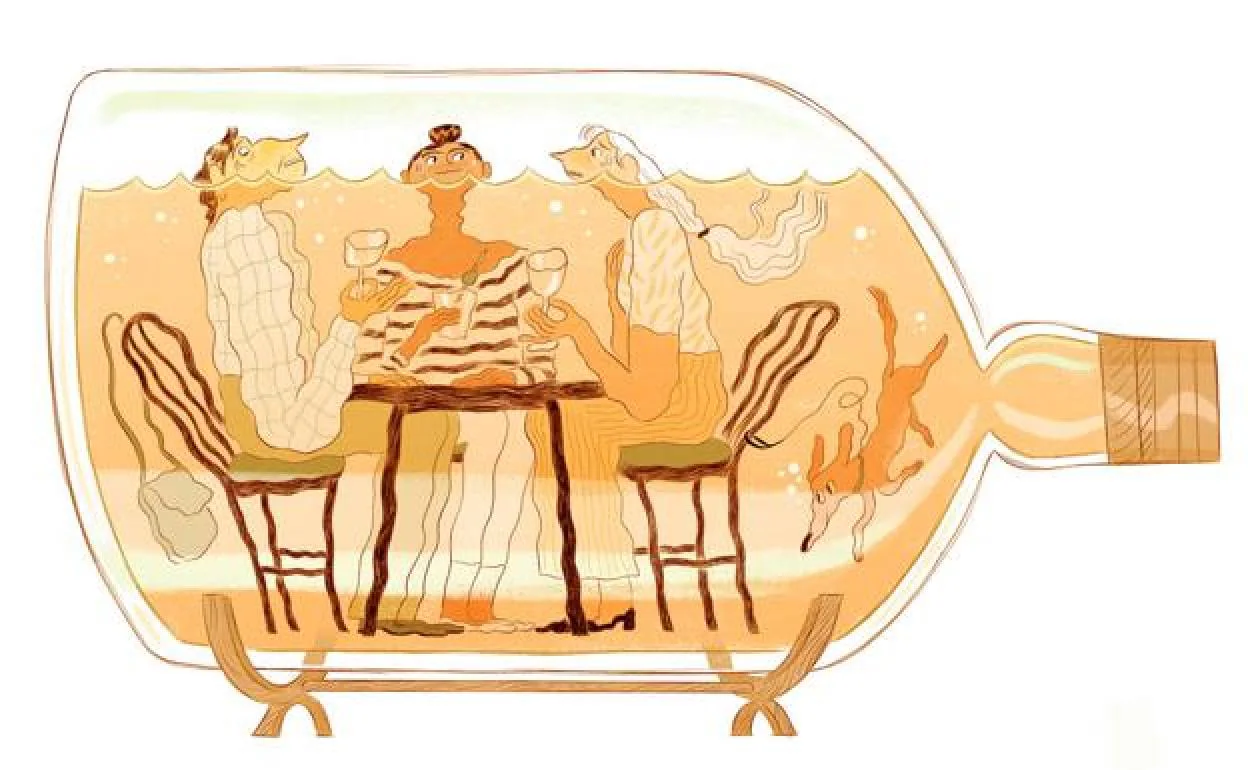’I don’t have a problem with drink’
Experts warn that ‘20% of people who drink alcohol every day end up being addicted'
CARMEN BARREIRO
Friday, 29 April 2022, 12:27
A beer and some crisps mid-morning, a glass of wine with lunch, a couple of drinks with friends after work... and the evening meal is still to come, with another glass of wine. Would you say that was too much for a working day? Do you think it is a lot or would you consider it normal? While you're thinking about it, add up the number of glasses of alcohol you normally drink in a week. Be honest. You'll probably be surprised, and not in a good way.
The answer to the first question is yes, it is too much. According to the theory, men shouldn't drink more than a beer or glass of wine a day (the equivalent to 20 grammes of alcohol) and women should only drink half of that. The reality, however, is very different. We live in a society where it is usual to drink alcohol; it forms part of our customs, to such an extent that 13 per cent of people over the age of 15 in Spain admit to drinking every day, making this the second country in the EU when it comes to drinking frequently, after Portugal.
We arrange to meet up for a few beers, we drink a toast at a relative's birthday party, there is cocktail hour... consuming alcohol in small quantities is usually very pleasant because it acts as a 'social lubricant' through its disinhibiting effects and nobody thinks badly of us for drinking it.
"It's very difficult for someone who is in this situation to admit that things have got out of hand"
"We can't actually be blamed for wanting to drink. Alcohol is embedded in our everyday life. It's relaxing, agreeable, but shouldn't be treated as a joke," warns Dr David Nutt, author of the book 'Drink? The New Science of Alcohol and Your Health'. The problem is when this sporadic consumption becomes chronic so that what was a beer with friends on a normal day becomes two, then three, four...
When sorrows learn to swim
Experts calculate that "about 20% of people who drink every day to socialise or to feel better end up developing a dependence on alcohol, with compulsive and persistent consumption which makes them drink daily even if they don't really want to," warns Lucía Hipólito, a professor in Pharmacy and Pharmaceutical Technology at the University of Valencia.
'I left my children in a shopping centre'
Pedro hit rock bottom the day he left his children in a shopping centre.
“That made me aware of the size of the my problem. I wasn’t the typical alcoholic we all think of and I didn’t admit my dependence because I thought it was normal.
"I didn’t drink an exaggerated amount, but I drank every day. And, what’s worse, I couldn’t stop.”
"There are people who need that 'little something' to alleviate their everyday stress and they turn to drink as a type of medication which anaesthetises them from their problems. That is very dangerous. It begins for pleasure or to feel a bit better and ends up as a dependence that can ruin your life. As Frida Kahlo used to say, she tried to drown her sorrows in liquor but the bastards learned to swim. And that's how it is," says Dr Rosa Molina, a psychiatrist at the San Carlos Clínico Hospital in Madrid, where patients are admitted every day due to alcohol-related problems.
"There are people who need that 'little something' to alleviate their everyday stress and they turn to drink as a type of medication which anaesthetises them from their problems"
The guidelines for somebody who can be considered at risk of alcohol dependence go beyond the image of somebody lying in the street with an empty bottle in their hand. "Addiction is a degenerative illness which is acquired when someone passes from consumption to abuse and from abuse to dependence. In other words, they are not capable of not drinking and, what's more, they keep needing more alcohol to achieve the same effect. They lose control of their life and they need to drink every day even though they may not want to," explains Sebastián Romero, a therapist and president of the Neros group's detoxification clinics in Asturias and Seville.
'I thought I could control it. I destroyed my family'
Raúl’s story is similar to that of a lot of addicts.
“I thought it was under control, but it wasn’t. It destroyed my marriage, my family, friendships... and my health,” said this young man who has completed rehab.
Nevertheless he has a message of hope: “There are ways out, specialists who can help you; but willpower is fundamental.”
In fact, the "clearest and most serious" sign of a person with this type of dependence, which is directly responsible for more than three million deaths worldwide each year, is denial. "It's very difficult for someone in this situation to admit that things have got out of hand: "I control it," "I'm not a drunk," "I know perfectly well what I'm doing,"... they make a lot of very convincing excuses rather than admit that they are at risk," explains Boris Rodríguez, a psychologist at the Fundación Real, which specialises in recovery from addictions.
"If you answer yes to any of these questions, you should start to worry and moderate your drinking," says David Nutt in his book. Do you normally drink more than you admit to? Have you been criticised for your drinking? Did that bother you? Have you missed work because of drink? "That is very important because one of the consequences of dependence is a reduction in work, social or recreational activities. Getting to work late, forgetting to pick up the children, performing less well... and also, alcohol acts as a trampoline for going on to consume other substances," warns Dr Molina.
